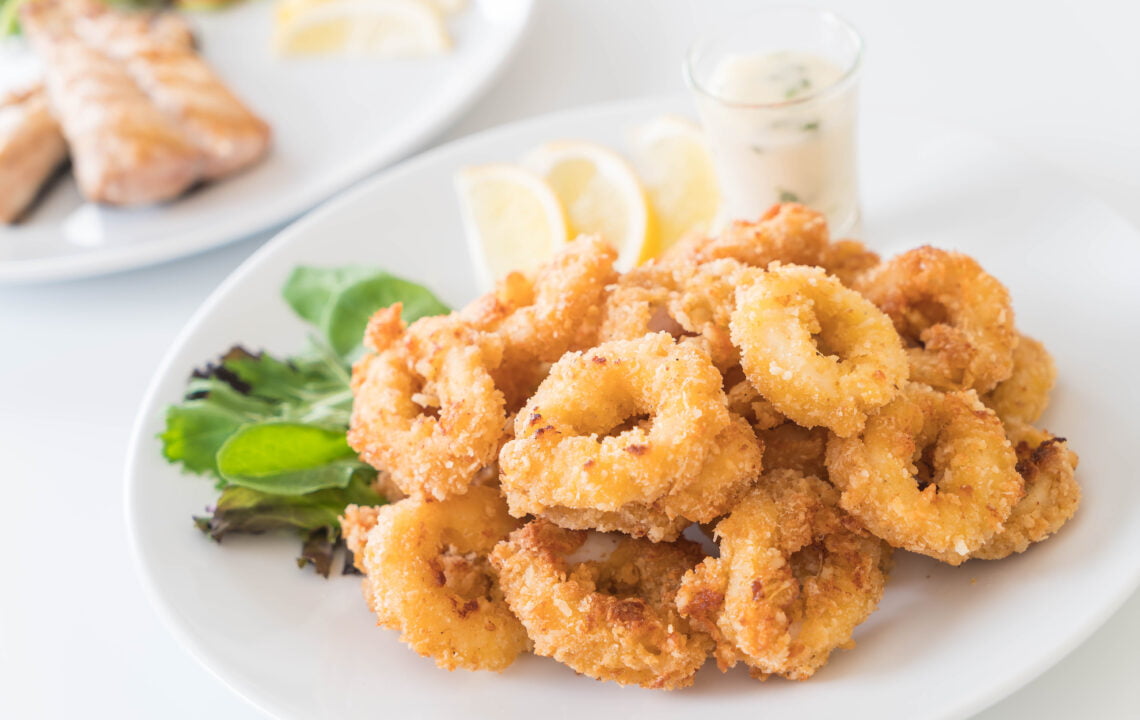Calamari, with its captivating charm and fancy name, beckons us to explore its culinary wonders. But can we enjoy calamari in ways as delightful as its appearance? Today, we embark on an adventure into the world of calamari—a journey to understand its origins, taste, preparation, and health benefits.
Calamari, often associated with Italy, is a type of seafood that holds a mysterious appeal for many. It’s tender and tasty, offering a delightful culinary experience. From the ocean to our plates, calamari takes us on a flavorful voyage.
Discovering the taste of calamari is just the beginning. We’ll learn how to prepare it at home and explore its nutritional perks, like protein and essential nutrients. But we’ll also consider who should be cautious with calamari, especially those managing diabetes.
While calamari offers many benefits, we’ll also discuss potential health concerns and precautions to ensure safe consumption. Join us on this delicious journey as we unlock the secrets of calamari and savor its delights with confidence and joy!
Calamari, often associated with Italy, is a type of seafood that holds a mysterious appeal for many. It’s tender and tasty, offering a delightful culinary experience. From the ocean to our plates, calamari takes us on a flavorful voyage.
Discovering the taste of calamari is just the beginning. We’ll learn how to prepare it at home and explore its nutritional perks, like protein and essential nutrients. But we’ll also consider who should be cautious with calamari, especially those managing diabetes.
While calamari offers many benefits, we’ll also discuss potential health concerns and precautions to ensure safe consumption. Join us on this delicious journey as we unlock the secrets of calamari and savor its delights with confidence and joy!
What Is Calamari?
Calamari is basically squid. Squid are creatures that live in oceans all over the world, and people have been eating them for a long time. You can find calamari in dishes from all over the world, especially in places like the Mediterranean. People really like having calamari in their meals.
What does calamari look like?
Well, squids, which are the main stars of the calamari dish, have some unique physical traits: they have a noticeable head, eight arms, and two long tentacles.
Squids come in various sizes, but the ones we usually eat are around 10 inches long. Found in oceans worldwide, calamari is a popular dish served on tables everywhere, from European coasts to Asian street food markets.
Squids come in various sizes, but the ones we usually eat are around 10 inches long. Found in oceans worldwide, calamari is a popular dish served on tables everywhere, from European coasts to Asian street food markets.
Disadvantage of Eating Calamari
While calamari can be tasty and nutritious, there are some reasons to be cautious about eating it:
- Mercury Levels: Calamari sometimes contains mercury, which is a toxic metal. Too much mercury in your body can cause health problems.
- Allergies: Some people are allergic to calamari. If you’re allergic to shellfish like shrimp or crab, you might also be allergic to calamari. Allergic reactions can range from mild itching to severe breathing difficulties.
- Sodium: Calamari can be high in sodium, which is a mineral found in salt. Too much sodium can raise your blood pressure, increasing your risk of heart disease and stroke.
- Pollution: Calamari can absorb pollutants like arsenic from the water they live in. Eating contaminated squid can expose you to these harmful substances.
- Fat Content: When calamari is fried, it can become high in unhealthy fats. Too much of these fats can contribute to weight gain and heart problems.
While calamari does offer protein and other nutrients, it’s important to be aware of these potential drawbacks and consider them when deciding how often to include Calamari in your diet.
Is Calamari Benefits for Health?
Yes in addition to its delectable taste, calamari also offers several health benefits. let’s take a quick look:
- Low in calories and fat: Calamari is a nutritious option for weight watchers as it contains fewer calories and fat.
- High in protein: It’s packed with protein, which is essential for muscle strength and energy.
- Rich in choline: Calamari contains choline, a nutrient beneficial for brain and liver health, along with antioxidants to combat harmful substances in the body.
- Omega-3 fatty acids: It provides omega-3s, beneficial for heart health and boosting the immune system.
- Vitamin C: Calamari is a good source of vitamin C, which supports overall health.
- Essential minerals: It contains minerals like iron, calcium, potassium, and copper, which are vital for various bodily functions.
- Low in salt: Calamari has a low salt content, making it a healthy choice.
- Overall health benefits: When included as part of a balanced diet, calamari can contribute to overall health and well-being
Calamari Benefits for Diabetes
Calamari offers several health benefits, particularly for those with diabetes:
Keeps Blood Sugar Steady: Calamari doesn’t have sugar and has vitamin B3, which helps control blood sugar levels. With 2.17 milligrams of vitamin B3 in every 100 grams, it gives you about 11% of what you need each day, which is great for managing diabetes.
Manages Cholesterol: Although Calamari, like other shellfish, has cholesterol, it’s low in fat and the cholesterol doesn’t get absorbed easily. Some studies even suggest that eating shellfish could help lower cholesterol levels in the blood.
Packed with Good Stuff: Calamari is full of important nutrients like protein, omega-3 fatty acids, vitamin C, iron, and calcium. These are all things your body needs to stay healthy.
Keeps Blood Sugar Steady: Calamari doesn’t have sugar and has vitamin B3, which helps control blood sugar levels. With 2.17 milligrams of vitamin B3 in every 100 grams, it gives you about 11% of what you need each day, which is great for managing diabetes.
Manages Cholesterol: Although Calamari, like other shellfish, has cholesterol, it’s low in fat and the cholesterol doesn’t get absorbed easily. Some studies even suggest that eating shellfish could help lower cholesterol levels in the blood.
Packed with Good Stuff: Calamari is full of important nutrients like protein, omega-3 fatty acids, vitamin C, iron, and calcium. These are all things your body needs to stay healthy.

How to cook calamari?
- Deep-frying: Many people love to cook calamari by deep-frying it until it’s crispy and golden. This makes the outside crunchy while keeping the inside tender and juicy.
- Grilling: Another popular way to cook calamari is by grilling it. This gives it a smoky flavor and a nice charred smell that makes it taste even better.
- Sautéing and Steaming: You can also cook calamari by sautéing it in a pan or steaming it. These methods give it different textures and flavors.
- Raw: If you enjoy eating seafood without cooking it, you’ll be pleased to know that calamari can be enjoyed raw as well. In dishes such as sushi and sashimi, thin slices of fresh calamari are served alongside rice or on their own, often accompanied by dipping sauces or garnishes. This versatility of calamari, being suitable for both cooked and raw preparations, demonstrates its adaptability to a variety of culinary styles and preferences.
Where does calamari come from?
In Europe, countries like Italy, Spain, Croatia, and Greece love using calamari in their dishes. They grill it, fry it, or mix it into pasta. In Asia, especially in China, Thailand, and Japan, calamari is a big part of street food. You can find it deep-fried or served raw in delicious ways.
What does calamari taste like?
Well, it depends on how it’s cooked. When it’s grilled, calamari is tender with a bit of chewiness, and it takes on the flavors of any spices used. If it’s deep-fried, it’s crispy on the outside and soft inside. Usually, it’s served with lemon juice or marinara sauce for extra zestiness.
Cultural Significance of Calamari
Calamari is really important in many places by the sea where people have been eating it for a long time.
Mediterranean Influence: In places like the Mediterranean, where people have long enjoyed seafood, calamari is a common ingredient in dishes like mixed fried seafood and seafood pasta, reflecting a strong connection to the sea.
Asian Cooking Traditions: In Asia, calamari is prepared in interesting ways, such as stir-frying or seasoning with salt and pepper, showing its adaptability to diverse cooking styles.
Uniting Cultures: Calamari brings people together regardless of their backgrounds. Its global popularity stems from its ability to create shared experiences and moments of enjoyment, cherished by people from diverse backgrounds worldwide.
Mediterranean Influence: In places like the Mediterranean, where people have long enjoyed seafood, calamari is a common ingredient in dishes like mixed fried seafood and seafood pasta, reflecting a strong connection to the sea.
Asian Cooking Traditions: In Asia, calamari is prepared in interesting ways, such as stir-frying or seasoning with salt and pepper, showing its adaptability to diverse cooking styles.
Uniting Cultures: Calamari brings people together regardless of their backgrounds. Its global popularity stems from its ability to create shared experiences and moments of enjoyment, cherished by people from diverse backgrounds worldwide.
Conclusion:
Calamari offers not only a delightful taste but also numerous health benefits, making it a popular choice in many cooking styles around the world. Despite some potential drawbacks, such as mercury content and allergenicity, calamari remains a nutritious option when consumed in moderation. Its versatility in cooking methods and cultural significance further enhance its appeal, bringing people together across diverse backgrounds to enjoy this beloved seafood speciality. Whether grilled, fried, or served raw, calamari continues to charm flavors and create shared experiences, making it a cherished cooking gem celebrated globally.





